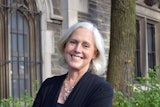Job Corps National Director
Lays Out Higher Education Agenda
By David Pluviose
Dr. Esther R. Johnson, the national director of the U.S. Department of Labor’s Job Corps program, offered her vision of the future of the organization during a speech kicking off the Corps’ annual leadership summit earlier this month. The Washington-based Job Corps is dedicated to providing educational and career pathways for disadvantaged 16- to 24-year-olds.
In her speech, Johnson, who is the first Black woman to head Job Corps, said she hopes to shift the program’s goals to steer students toward college instead of stopping with a high school diploma. The new higher education emphasis could prove critical for students hoping to compete in the job market of the future. In a survey of 431 human resource professionals, 28 percent anticipated hiring fewer people with only a high school diploma, and 49 percent said they plan to hire more associate degree-holders.
“We continue to turn out many high school diplomas. But we can and will do even better,” Johnson said in the speech.
“Over the longer term, we must be looking beyond the high school diploma. Today, slightly more than 9 percent of our graduates continue their education beyond Job Corps. When we meet here next year, I would like to see that number doubled to 20 percent.”
The Job Corps program has historically been focused on at-risk, disadvantaged youth. However, “when you go around to these Job Corps centers, you see anything but at-risk students,” Johnson said. “They have so much promise, so much potential. They are so intelligent, they just need someone to care about them, to encourage them, to push them and to tell them that they can do it.”
She said her father’s educational experience helped push her towards higher education. He was unable to attend high school because there were no high schools for Blacks where he grew up. “So I think education is the key to get from where you are to where you need to go in the future,” she said. “Not everybody is going to go to a four-year college, and not everyone’s going to get an [associate] degree, but there’s certainly learning opportunities above the high school level that our students will need to participate in to move up their
career ladder.”
Donna Kay, the Chicago regional director for Job Corps, says the low expectations of staff workers in the program’s 122 centers aren’t helping push the students towards college. “They don’t envision our students going to college,” she says. “Most of them won’t admit it, but when you talk to them, they’re not talking to the kids [about college].”
She adds that local Job Corps staff often wait until they see a particularly intelligent student and then “near the end of the training process they say, ‘Oh well, are you interested in college?’ We need to figure out how to get them thinking about it early on, and I think [the students] would work harder on math and reading if they really believed that they could go to college.”
Delois White, with the St. Louis region Job Corps, agrees with Johnson that the program needs to set students on the path towards college.
“In order to meet the needs of the 21st century, our young people will have to extend their educational opportunities and become lifelong learners,” she says. “To be able to meet potential growth and potential promotional opportunities, they’re going to have to get that education in there. And they can either do it through Job Corps or do it on their own.”
During her address, Johnson described an experience she had at a Job Corps center in Edison, N.J. She said a culinary arts student called her his hero, but she corrected him and said he was the hero. But the importance of Job Corps students seeing diverse faces in the upper echelons of the program is not lost on her.
“I am going to do everything that I can to make sure that our young people have role models, diverse role models that they can look to and say, ‘I can do that. I can be just like this person if I put my heart and mind and soul into it,’” Johnson says.
“We’re sending out tutors and mentors to Job Corps centers to work with these young people,” she adds. “We’re sending inspiring speakers, diverse speakers to Job Corps centers so that our students can have role models in every ethnic group. And yes, we can do it, we can be successful with these students.”
© Copyright 2005 by DiverseEducation.com
















